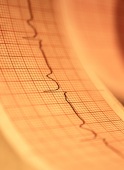- Double Mastectomy May Offer No Survival Benefit to Women With Breast Cancer
- Toxic Lead Found in Cinnamon Product, FDA Says
- Certain Abbott Blood Sugar Monitors May Give Incorrect Readings
- Athletes Can Expect High Ozone, Pollen Counts for Paris Olympics
- Fake Oxycontin Pills Widespread and Potentially Deadly: Report
- Shingles Vaccine Could Lower Dementia Risk
- Your Odds for Accidental Gun Death Rise Greatly in Certain States
- Kids From Poorer Families Less Likely to Survive Cancer
- Tough Workouts Won’t Trigger Cardiac Arrest in Folks With Long QT Syndrome
- At-Home Colon Cancer Test Can Save Lives
Sleeping Pill Use Tied to Poorer Survival for Heart Failure Patients


A new study suggests that the use of sleeping pills greatly increases the risk of serious heart problems and death in people with heart failure.
“Sleeping problems are a frequent side effect of heart failure and it is common for patients to be prescribed sleeping pills when they are discharged from hospital,” study author Dr. Masahiko Setoguchi explained in a news release from the European Society of Cardiology.
However, “given that many heart failure patients have difficulty sleeping, this is an issue that needs further investigation in larger studies,” he said.
In the study, the Japanese team examined the medical records of 111 heart failure patients admitted to a Tokyo hospital from 2011 to 2013. The patients were followed for up to 180 days after they left the hospital.
Patients who took sleeping pills — drugs called benzodiazepine hypnotics — were eight times more likely to be readmitted to hospital for heart failure or to die from heart-related causes than those who did not take sleeping pills, the researchers found.
While the study couldn’t prove cause and effect, the researchers theorize that benzodiazepine sleeping pills may affect both heart function and breathing.
Heart failure patients “who use sleeping pills, particularly those who have sleep-disordered breathing, should be carefully monitored,” Setoguchi concluded.
Findings presented at medical meetings are typically considered preliminary until published in a peer-reviewed journal. However, one expert agreed that the findings are cause for concern.
“The results from this small, single-center study raise a potential alarm about the use of benzodiazepines in a heart failure population,” said Dr. Sean Pinney, director of the advanced heart failure and cardiac transplant program at The Mount Sinai Hospital in New York City.
He noted that many of these patients are aged and have other illnesses, such as lung disease. Pinney noted that other reports have found a higher risk of serious adverse events, generally, in elderly people taking sleeping pills. The new findings, which focus on people with heart failure in particular, “suggest that it may be best to avoid these drugs in this vulnerable population,” Pinney said.
The study was to be presented in Athens, Greece, on Saturday at the Heart Failure Congress, the annual meeting of the Heart Failure Association and the European Society of Cardiology.
More information
The American Academy of Family Physicians has more about heart failure.
Source: HealthDay
Copyright © 2024 HealthDay. All rights reserved.










